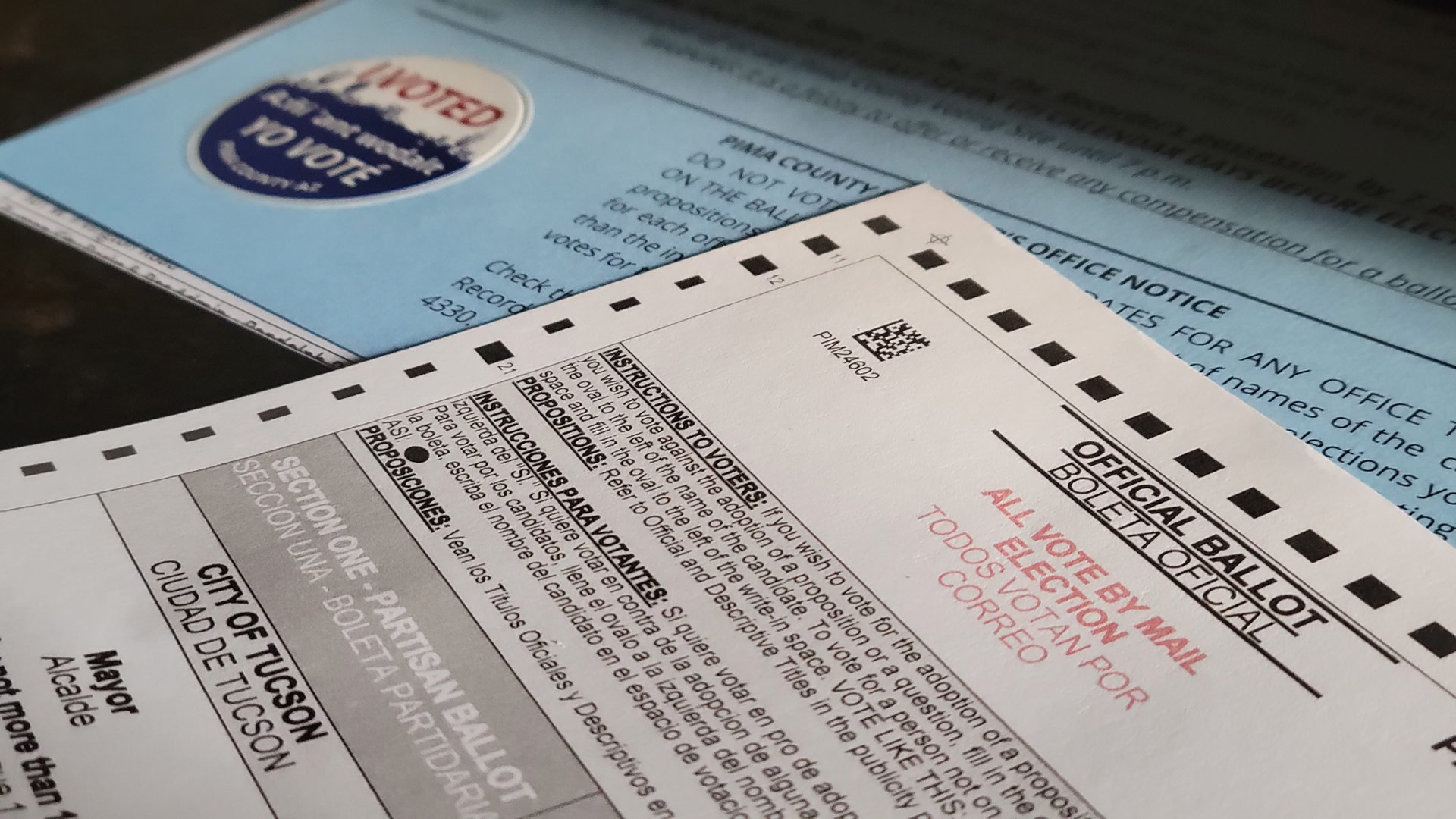 A mail-in ballot from the 2023 Pima County Election.
A mail-in ballot from the 2023 Pima County Election.
Even with nearly eight months until the 2024 General Election, a Trump vs. Biden rematch is all but guaranteed.
Both candidates won enough delegates to secure their party’s nomination last week, and today’s presidential preference election here in Arizona will be nothing new.
“It’s gonna be boring. It’s gonna be an uneventful election night,” said Republican strategist Barrett Marson.
Arizona has held a preference election instead of a primary for the last 30 years; the purpose of which is to determine how voters in each respective party feel about the candidates for president.
This year’s results are unique in their lack of contest, said Mike Noble, Chief Pollster for Noble Predictive Insights.
“This is the first time we've seen in a long, long time, presidential race where the two presumptive nominees are kind of foregone conclusions,” Noble said.
The preference is closed, meaning only registered Republicans and Democrats can vote for their party's candidates in this election. Those who aren’t strictly party voters miss out, Noble said.
“Independents? Sorry, no game for you,” said Noble.
Some people temporarily change their Independent status and register as one of the parties to vote in the preference, but Noble said that often becomes an inconvenience that discourages people from voting.
“Adding any extra steps in general really ends up impacting participation,” he said.
Another key difference, established by a 1999 Arizona Attorney General’s opinion, is that the results of the preference don’t officially determine what candidate will appear on the November ballot, and not all the candidates who will be on that ballot can participate.
State party officials will take the results of today’s election to their party conventions later in the year, where the official delegate voting takes place.
This year’s preference election was more interesting to those that voted early in mid-February, when multiple candidates in both parties were still in the race.
According to Marson, votes for other candidates at this point in the race are intentional.
“At this particular point, if you're voting for someone other than the two nominees, you are as a voter trying to make a small statement about your dissatisfaction with your party's presumed nominee,” he said.
That information is valuable to the candidates after the fact, Marson said, because it shows them where they need to focus their campaigning.
“That doesn't necessarily mean you won't vote for that person coming November. But it is a sign that maybe a candidate has some problems with their base voters,” he said.
Since October 7th, this certainly applies to a far-left section of progressives who are vocally unhappy with President Biden’s handling of the war in Gaza.
Voters in Michigan’s Democratic primary a few weeks ago organized an “uncommitted” campaign that secured over a hundred thousand votes.
Those same feeling are here in Tucson as well, like Jamie Woodard, a registered Democrat.
“I don’t support Joe Biden because he’s supporting a genocide,” Woodard said. “I really don’t see how he’s been doing anything much better than Trump was…I’m leaning towards socialist slash Working Party kind of candidates.”
Arizona doesn’t have any write-in candidates or “uncommitted” options for the preference election.
The candidates that have officially dropped out, but still remain on the ballot, are the remaining way voters can express their dissatisfaction.
The movement Vote Ceasefire AZ is encouraging those who feel frustrated to vote for Marianne Williamson, a Democrat who was outspoken about a ceasefire before ending her campaign in February.
“They're not really backing her as a candidate, specifically, it's just a protest vote. It's acknowledging that we're not going to be complicit in genocide, even though our tax dollars obviously are supporting this,” said David Feagin, an organizer with the Party for Socialism and Liberation in Tucson.
Arizona will have to wait until numbers come out to see just how much the Middle East conflict is impacting Arizona’s choices for president.
Noble said he and other pollsters will be looking closely at protest votes, but he also thinks there’s likely to be a disconnect in protest voters' perceived impact and the actual results.
“It's gotten a lot of press and a lot of attention, but based on what I’ve seen so far, the perception is usually a little bit stronger than the reality of that impact. But that doesn't mean it's not there. It's just a question of how big is it, right?” he said.
Israel-Palestine is just one issue voters are thinking about heading to the polls. There’s widespread dissatisfaction in this election cycle, according to Noble.
“They’re making this choice between Red Pill, Blue Pill. But these pills this year, it’s anthrax and cyanide,” he said.
With unhappy voters on both sides, today’s preference election might be something to ignore, or a place to express frustration. But no matter how you feel about today’s vote, it’s a sneak preview of what is to come in November.; a tight race between two candidates who face unpopularity within their own parties.
Results from the Presidential Preference Election will start rolling in around 8 tonight and continue throughout the week.

By submitting your comments, you hereby give AZPM the right to post your comments and potentially use them in any other form of media operated by this institution.